The 2013 MacBook Air Review (13-inch)
by Anand Lal Shimpi on June 24, 2013 12:01 AM ESTPCIe SSD Performance
I created a Boot Camp partition of around 120GB and ran our client iometer benchmarks to put the new PCIe SSD’s performance in perspective.
Peak random read performance is roughly comparable to the previous-generation Samsung controller. Random write performance took a bit of a hit but it's still more than fast enough for client workloads. Sequential speeds are much improved but the gains are really only visible at high queue depths. Low queue depth sequential transfers can’t be split up enough in order to really require PCIe.
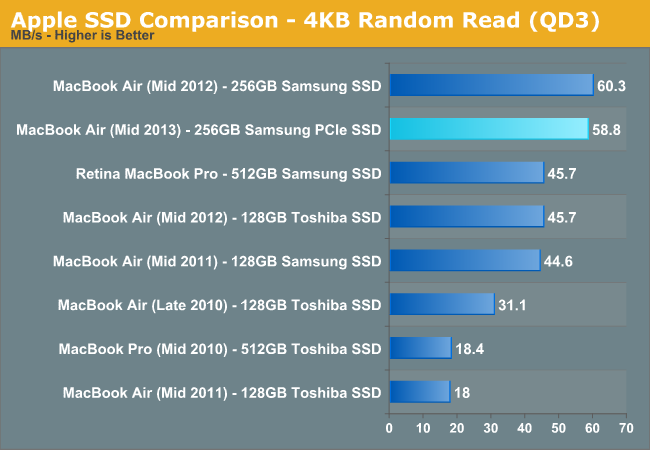
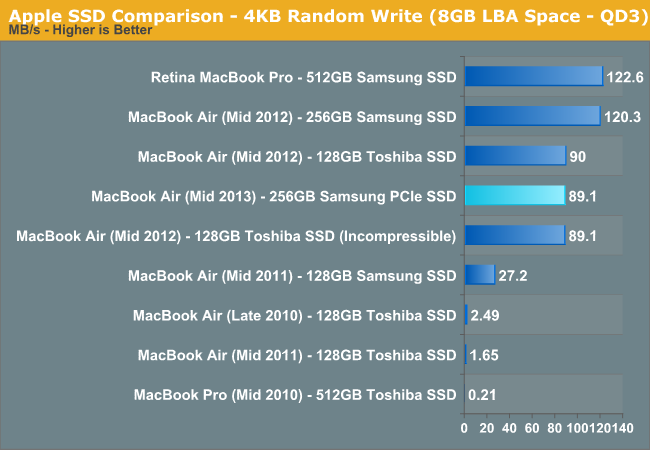
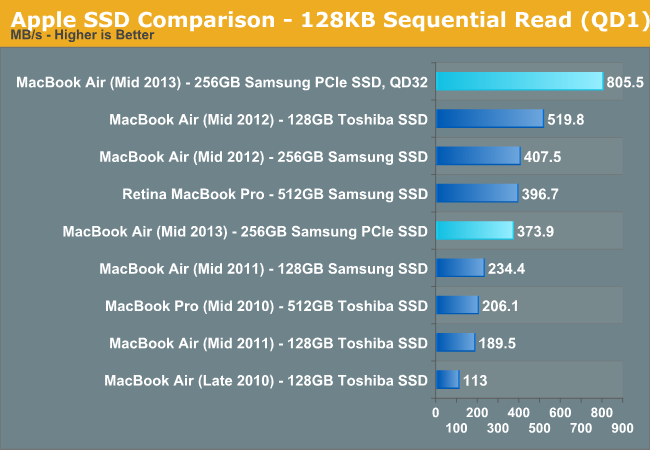
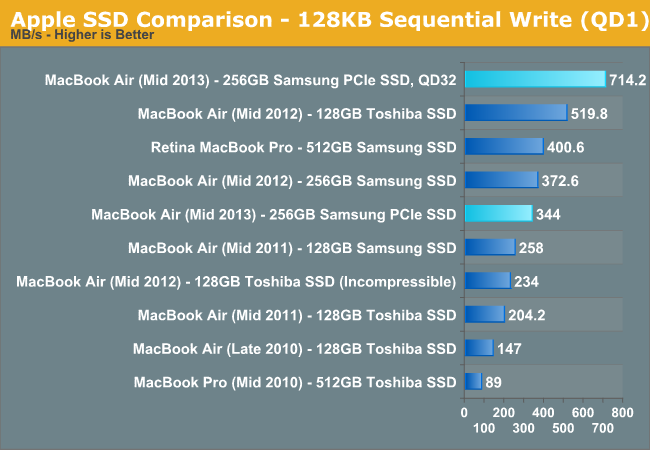
What does this mean in the real world? The new SSD is definitely snappier in system use. Wake from sleep is a bit quicker, as are application launches. The funny thing is that with the exception of high-speed Thunderbolt arrays, most external sources aren’t fast enough to even stress the new storage subsystem in the MacBook Air. Large file copies confined to the drive itself benefit a bit as well. I saw roughly 300MB/s reads and 300MB/s writes when copying a large dmg from/to the MacBook Air’s PCIe SSD (compared to roughly 200/200MBps on the old Samsung SATA SSD from the rMBP15).
If you have an external Thunderbolt array with at least a couple of drives, you should have no issues matching the MBA’s internal SSD performance.
Seeing as how this is our first experience with Samsung’s PCIe SSD controller, I wanted to get a feel for how the drive behaved under extended high queue depth random writes. I ran a modified version of our IO consistency test. The test was modified to run in a 91GB space on the MBA’s Boot Camp partition. I made sure to fill the rest of the drive completely, but the random writes were effectively constrained to 91GB of LBAs. When I get back from the UK I’m going to try setting up an external boot drive and will do some more extensive testing on the drive.
The IO consistency results, at least within a somewhat constrained space actually look really good. I have a feeling that Samsung might have improved its IO consistency story with this generation, but I’ll wait on saying for sure until I’ve had a chance to do some more work with the controller. For the vast majority of users however, solid random write performance like this over a 91GB space on a full drive is actually very good news.


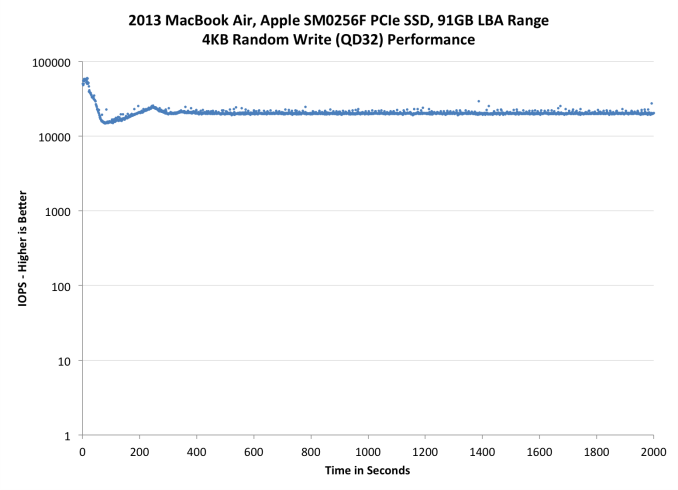
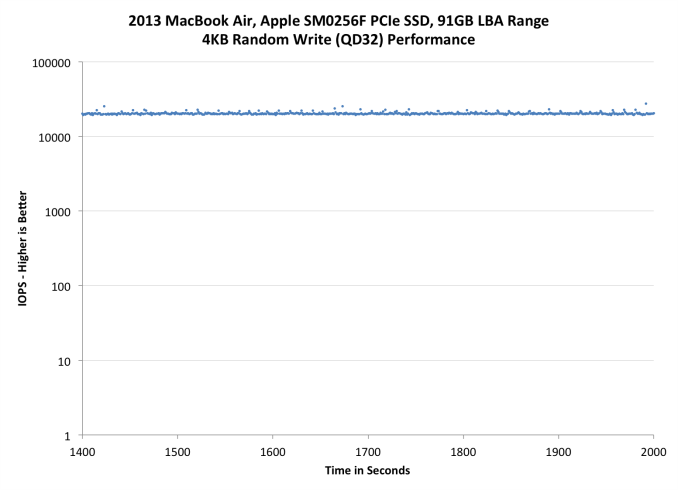
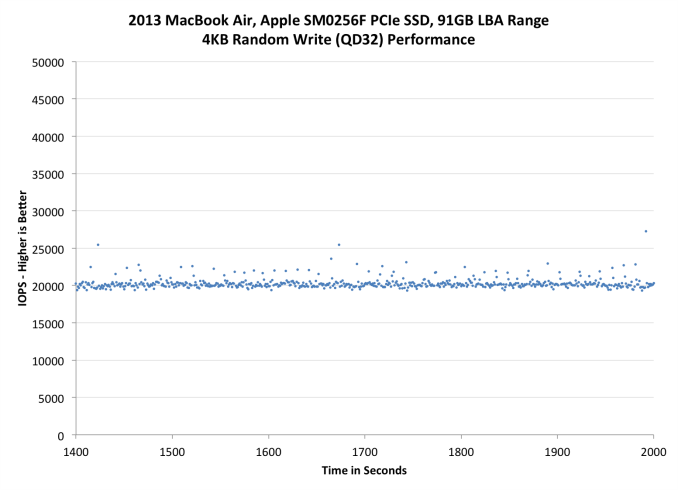








233 Comments
View All Comments
Gamingphreek - Monday, June 24, 2013 - link
Anand (or anyone else) -- I'm curious as to the effects of using Bootcamp. Doesn't bootcamp bootstrap the system into a legacy BIOS and create a fake-ish MBR? As such, aren't AHCI, EFI, and other new technologies presented in a legacy mode?For instance, on my mid-2010 MBP, I know that in bootcamp I do not have switchable graphics support and also do not have AHCI storage support.
Any comments on this functionality/limitation would be appreciated.
A5 - Monday, June 24, 2013 - link
I've never seen a $500 Ultrabook that wasn't a clearance of last year's chips. Also, the 13" is only $100 more, and the prices are pretty good for an ultraportable.Paapaa125 - Monday, June 24, 2013 - link
Show me a 1,3kg 13" Ultrabook with even a decent touchpad, 128SSD, i5 Haswell, 12h battery life for less than MBA 13" now sells. Really, it is not very expensive considering the HW you get! Not to mention great OS.Shadowmaster625 - Monday, June 24, 2013 - link
So it has Air in its name but it weighs more than 1 liter of water? Makes sense....Sm0kes - Monday, June 24, 2013 - link
Huh? I suspect marketing and branding is lost on you.Sushisamurai - Tuesday, June 25, 2013 - link
He has a point, with the new osX mavericks, a better name would be "MacBook water"seapeople - Tuesday, June 25, 2013 - link
It's actually specifically specced to equal the weight of compressed air at 3500ksi. Feel silly now? Leave the marketing to us engineers.tipoo - Monday, June 24, 2013 - link
It's been a long time since OSX vs Windows native gaming performance has been visited, I'd like to see that updated since there have been almost three OS releases since then and a small but significant influx of native games.ctwise - Monday, June 24, 2013 - link
It'll have to wait for OS/X Mavericks. That moves from OpenGL 3.x to OpenGL 4.x and, reportedly, improves performance significantly for even OpenGL 3.x clients (http://rk.md/2013/opengl-osx-mountain-lion-vs-mave...Krysto - Monday, June 24, 2013 - link
Holy cow. The Haswell chips in Airs have dropped to 1.3 Ghz now? Yikes. Before we know it Intel will claim 2W TDP for Core chips (but pay no attention to the 200 Mhz clock speed!)